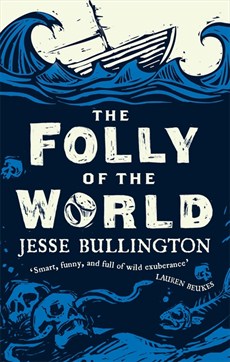 The Folly of the World is about the most hilarious book I’ve read. If not ever, then, I don’t know, at least since my last Christopher Moore, maybe. Folly is . . . it’s got a mouth like Deadwood, a plot like a Coen Brothers movie, and it looks for all the world to me like Hagar the Horrible. Better, even, it’s set in fifteenth-century Holland. Which, trust me, before reading this, I thought that was all . . . I don’t know what I thought it was, really. Just some place I’d never thought about. But now it’s as real to me as any place I’ve been. And maybe even better.
The Folly of the World is about the most hilarious book I’ve read. If not ever, then, I don’t know, at least since my last Christopher Moore, maybe. Folly is . . . it’s got a mouth like Deadwood, a plot like a Coen Brothers movie, and it looks for all the world to me like Hagar the Horrible. Better, even, it’s set in fifteenth-century Holland. Which, trust me, before reading this, I thought that was all . . . I don’t know what I thought it was, really. Just some place I’d never thought about. But now it’s as real to me as any place I’ve been. And maybe even better.
As gritty and exotic and rollicking as Folly is, though, really, it’s the writing that hooks you. Bullington’s prose. No, his precision. I read this on Kindle, and, being a perpetual gunjumper, I always swipe to the next page a few words too early. Like, those words still register, but they don’t go through my brain, so much, if that makes any sense. Anyway, with Folly, I kept doing that, of course, but then I kept paging back. Just to luxuriate in the word-choice, in the on-the-noseness of this or that verb, and: the vocabulary. Bullington is never showing off with it, but—how in the world does he know all these maritime terms? Is ‘maritime’ even the right word for a drowned city? And do you know what baby eels are called? It’s in Folly of the World. And so much more. You know how, when you’re reading a George RR Martin novel, you’re kind of super-impressed at how in the world one person can know so ridiculously much about castles? Like, what every last little room is called, and its history? This is how well Bullington knows all the armors and clothes and food and transportation and slang of this whole wayback Holland culture.
And, the story. It completely works. I mean, as I’ve said, I so, so dug his The Sad Tale of the Brothers Grossbart and The Enterprise of Death—each maybe the best novel I read in their respective years—but there’s a kind of tenderness here, and narrative completeness, that hasn’t been there before, quite. It’s like Bullington’s been stripping his story down farther and farther. And now, Folly, it’s the core. And, sure, his novels get classed Fantasy, and there’s nothing wrong with that there’s everything good with that. It’s probably the proper shelf  for his first two, even, as they’ve got some serious crazy stuff going on. This one, though . . . I don’t know about placing it on the fantasy shelves, quite. When he talks about it, he says it’s kind of caper-novel, and I’d agree. But it’s one where the caper fades into the background, allowing us to invest so much in these characters, and what they want, and what they need. It gets to the point where we’re pre-forgiving Bullington for any contrivances he might pull, if those contrivances can just deliver these characters to a good place. Except of course there are no contrivances. And we still end up not just happy, but with such a resonant ending.
for his first two, even, as they’ve got some serious crazy stuff going on. This one, though . . . I don’t know about placing it on the fantasy shelves, quite. When he talks about it, he says it’s kind of caper-novel, and I’d agree. But it’s one where the caper fades into the background, allowing us to invest so much in these characters, and what they want, and what they need. It gets to the point where we’re pre-forgiving Bullington for any contrivances he might pull, if those contrivances can just deliver these characters to a good place. Except of course there are no contrivances. And we still end up not just happy, but with such a resonant ending.
There’s two writers I read whom I dig, and wish I could learn their tricks, but I never quite can. One’s Craig Clevenger. Jesse Bullington’s the other. His individual scenes are so fun, so light, so intense, but there’s never anything at all extra to them. Each scene—each line, really—feels culled from something larger, as if he’s only giving us the pieces good enough to have survived fifty brush burnings. It makes for some solid reading. Can’t wait for the next one.
_______
Also, one of my ex-students reviewing one of my friends—Jesse—at Strange Horizons




